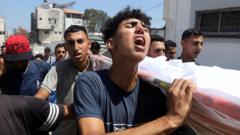In a rapidly intensifying conflict, Israel and Iran have exchanged missile attacks after Israel targeted Iranian military leaders and nuclear facilities, leading to casualties and global concerns over a potential broader war.
Escalating Tensions: Israel and Iran Engage in Intense Military Clashes

Escalating Tensions: Israel and Iran Engage in Intense Military Clashes
A retaliatory cycle of airstrikes and missile attacks erupts between Israel and Iran, as tensions escalate following strikes on military leaders and nuclear sites.
The recent military exchanges between Israel and Iran have escalated tensions in the region, marking one of the most intense confrontations in decades. The conflict reignited on June 13, when Israel launched significant airstrikes, killing prominent Iranian military officials and damaging critical nuclear sites, including the Natanz facility. In response, Iran retaliated by firing ballistic missiles at targets around Tel Aviv, injuring dozens of Israelis.
As the reciprocal attacks continued, Israeli jets and drones wreaked havoc across Iran, targeting essential military infrastructure and further prompting Iranian missile barrages. Eyewitness accounts from both nations detail scenes of chaos, destruction, and fear.
In Tel Aviv, injurious impacts from the Iranian missiles led to serious injuries, with reports indicating casualties in both cities, including fatalities. Israeli authorities confirmed over twenty wounded. Amid the strikes, Iran's ambassador to the UN alleged that Israeli attacks had killed 78 people and injured hundreds in Iran.
The global reaction has been swift, with various nations urging both sides to exercise restraint and caution. Meanwhile, Israeli leaders, including Prime Minister Benjamin Netanyahu, reasoned that the assault was necessitated by security concerns regarding Iranian nuclear ambitions, framing it as an essential move to preempt future threats.
The U.N. and other international organizations raised alarms regarding the potential humanitarian consequences of the conflict, as civilians in both countries find themselves caught amid military engagements. President Trump’s administration navigated the political landscape of U.S. involvement, balancing support for Israel against calls for diplomatic solutions and regional stability.
The unfolding scenario raises questions about the long-term implications of military aggression and the possibility of a broader conflict involving global powers. In the immediate term, both nations are braced for further exchanges, with military forces prepared for an ongoing operational campaign, signaling a volatile and unpredictable future for East-West relations in the Middle East, especially as both parties engage in operations that target civilian populations and infrastructure.
Ultimately, the intensifying military actions reflect a wider geopolitical struggle that could reshape alliances and alter the course of peace in the Middle East for years to come.
As the reciprocal attacks continued, Israeli jets and drones wreaked havoc across Iran, targeting essential military infrastructure and further prompting Iranian missile barrages. Eyewitness accounts from both nations detail scenes of chaos, destruction, and fear.
In Tel Aviv, injurious impacts from the Iranian missiles led to serious injuries, with reports indicating casualties in both cities, including fatalities. Israeli authorities confirmed over twenty wounded. Amid the strikes, Iran's ambassador to the UN alleged that Israeli attacks had killed 78 people and injured hundreds in Iran.
The global reaction has been swift, with various nations urging both sides to exercise restraint and caution. Meanwhile, Israeli leaders, including Prime Minister Benjamin Netanyahu, reasoned that the assault was necessitated by security concerns regarding Iranian nuclear ambitions, framing it as an essential move to preempt future threats.
The U.N. and other international organizations raised alarms regarding the potential humanitarian consequences of the conflict, as civilians in both countries find themselves caught amid military engagements. President Trump’s administration navigated the political landscape of U.S. involvement, balancing support for Israel against calls for diplomatic solutions and regional stability.
The unfolding scenario raises questions about the long-term implications of military aggression and the possibility of a broader conflict involving global powers. In the immediate term, both nations are braced for further exchanges, with military forces prepared for an ongoing operational campaign, signaling a volatile and unpredictable future for East-West relations in the Middle East, especially as both parties engage in operations that target civilian populations and infrastructure.
Ultimately, the intensifying military actions reflect a wider geopolitical struggle that could reshape alliances and alter the course of peace in the Middle East for years to come.





















